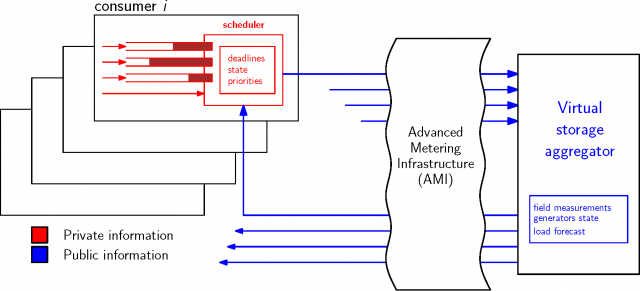Investigators:
Mardavij Roozbehani, LIDS, MIT; Munther Dahleh, LIDS/EECS, MIT; Mutasim Salman, EBRC, KISR

Virtual storage is a resource that can function like physical storage devices by “supplying" or consuming power on-demand. The main difference with physical storage is that the “supply" is virtual and is achieved by negating demand at load buses. Virtual storage can be enabled by proper coordination of the start time of shiftable loads in a predictable or controlled manner, which is in some sense analogous to buffering in communication networks. The goal of this project is to develop a novel and holistic architectural approach to the problem of organization of flexible electricity loads in order to create virtual energy storage in a way that can be reliably accessed by the system operators, either as an ancillary service or a primary resource for matching demand with variable supply. The main technical challenges are information constraints and scalability. This project addresses scalability through layering: a congestion control layer and a scheduling layer are envisioned. The proposed layered architecture is inherently scalable and modular. The layering allows for satisfying the quality of service requirements of the users while exploiting the full hosting capacity of the grid systematically and efficiently. Modularity provides freedom in designing and adopting various demand response technologies and end-user protocols at the scheduling layer within the constraints defined by the architecture. Creating virtual storage or buffering at load buses in a properly controlled fashion also enables decentralized control due to the induced separation between the physical layer and control layer. This is a much desired property for improving robustness and efficiency of power distribution grids. This project thus directly contributes to addressing some of the most significant challenges in large scale integration of renewable energy generation posed by uncertainty and variability.
Link to Lab:
